The Cowboy Corgi is a mixed breed that has become very popular in recent years with dog enthusiasts and animal lovers alike.
The Cowboy Corgi is a cross between the Australian Cattle Dog and the Pembroke Welsh Corgi.
As a result of these two wonderful breeds being crossed, we now have a small but highly energetic dog that can be the perfect work companion or simply a home pet to be adored by the whole family.
If you would like to own a high-energy worker or cuddly companion, keep reading to learn more about the Cowboy Corgi!
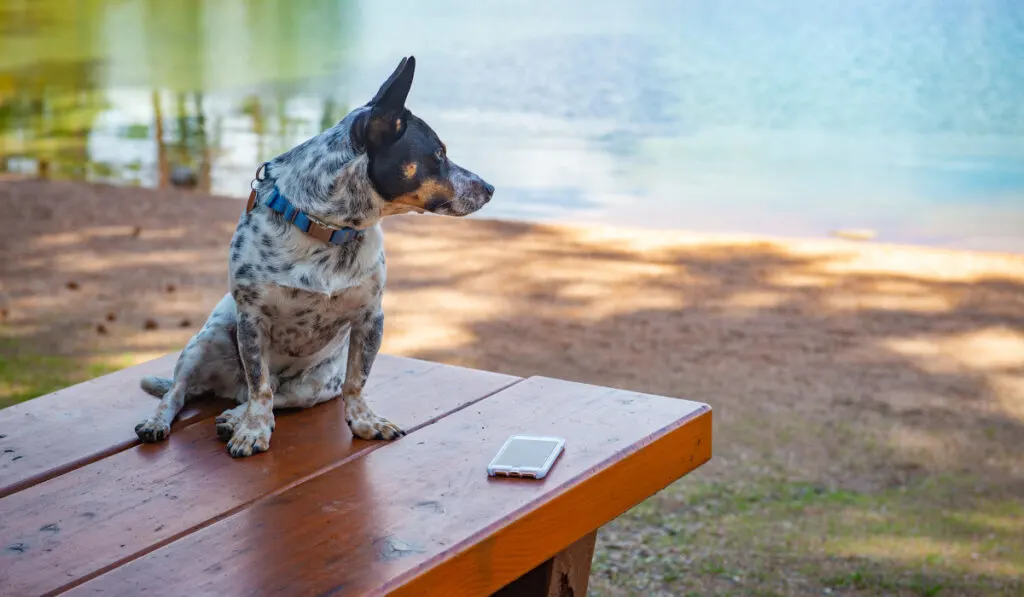
Table of Contents
Origin
The Cowboy Corgi is a cross between what some people might consider two unlikely candidates.
The first is the Australian Cattle Dog. An energetic, hard-working dog that the Australians developed for driving cattle across the rough terrain of the Australian outback in very harsh conditions.
And the other is the Pembroke Welsh Corgi, an incredibly famous dog for completely different reasons.
The Pembroke Welsh Corgi was part of the British royal family for more than 70 years and was the favorite companion of Queen Elizabeth II.
Till her death in 2022, Queen Elizabeth had owned and loved as many as 30 Pembroke Welsh Corgis, and they often featured in footage of the British monarch while at her home in Buckingham Palace.
But, as a matter of fact, the Pembroke Welsh Corgi is also a cattle-herding dog breed. This excellent working dog served its time in the Welsh border region with England known as Pembrokeshire.
This largely agricultural area of Wales is well known for its wooded hills dotted amongst the mountainous moorland. The Pembroke Welsh Corgi needed to have an abundance of energy to work such terrain.
Breed Overview
| Height | Between 13 to 20 inches (33 to 50 centimeters) |
| Weigh | Between 26 and 40 pounds (11 and 40 kilograms) |
| Body type | Barrel-shaped body and short legs |
| Coat type | Medium-length double coat |
| Coat color | Sable, roan, or merle, tri-color coat colors and patterns |
| Temperament | Intelligent, active, and loyal |
| Care | Shedding requires regular grooming |
| Training | A very intelligent breed, easy to train |
| Health | Hybrid dogs may inherit health concerns from the parent breeds |
| Life Expectancy | 12 to 15 years |
| Value | Somewhere between $1,000 and $2,800 |
Temperament
The Cowboy Corgi has a great mix of the characteristics of its parent breeds. While the Australian Cattle Dog has a loyal, protective but cautious nature, the Pembroke Welsh Corgi is outgoing and very confident. But both are very intelligent and bursting with energy.
Cowboy Corgis, as a result, are intelligent, great with kids, loyal, respond adorably to care and affection, and are bundles of fun. But new owners should be aware that they also have endless energy.
The Cowboy Corgi has been known to show frustration if not adequately exercised by taking out all their pent-up energy in a sometimes destructive manner. So, if you wish to own one of these amazing dogs, make sure it has an outlet for its abundance of energy.
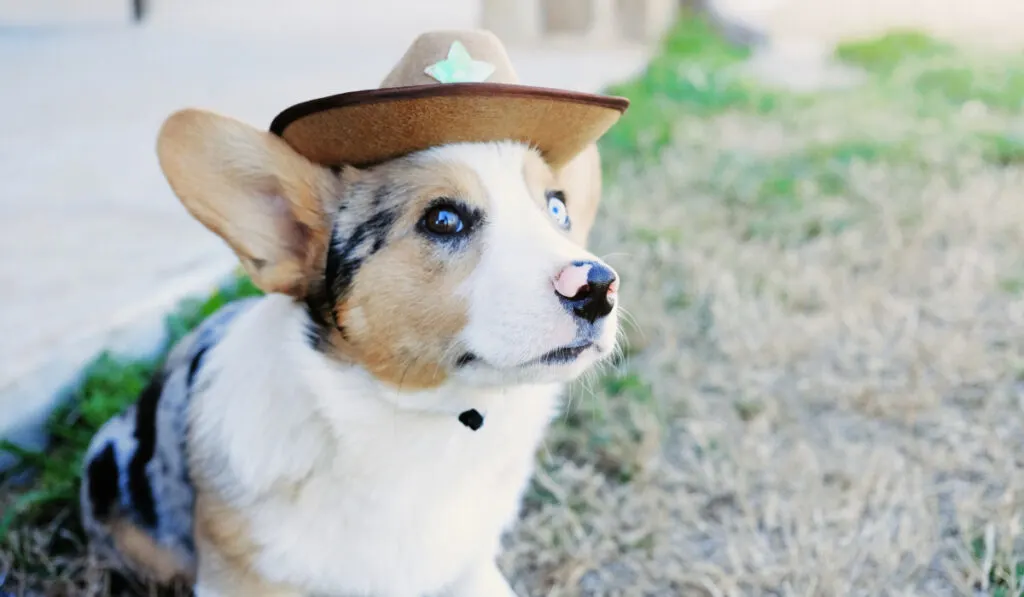
Cowboy Corgis Won’t Hesitate to Raise the Alarm
If everything is nice and peaceful around your neighborhood, Cowboy Corgis rarely bark, which is great news for your neighbors. They are generally a quiet breed.
Due to their absolute devotion to their adopted family, Cowboy Corgis are tremendous watchdogs.
They will become very familiar with the day-to-day sounds of their surroundings, even if your house is full of noisy kids.
If they hear something out of the ordinary, on the other hand, they will raise the alarm by barking. If there is a more serious situation, like an intruder in your home, your Cowboy Corgi will do whatever is necessary to protect you.
Size
It’s difficult to precisely describe the physical traits of a mixed-breed dog because one parent’s genes can be more dominant than the other. Having said that, Cowboy Corgis seem to lean towards the Pembroke Welsh Corgi when looking at their tail or stature.
They tend to have docked tails, and their short legs carry a long, barrel-shaped body like their Corgi parents. Cowboy Corgis are usually between 13 to 20 inches (33 to 50 centimeters) in height and can weigh between 26 and 40 pounds (11 and 40 kilograms).
Did you know that corgi means “dwarf dog” in the Welsh language?
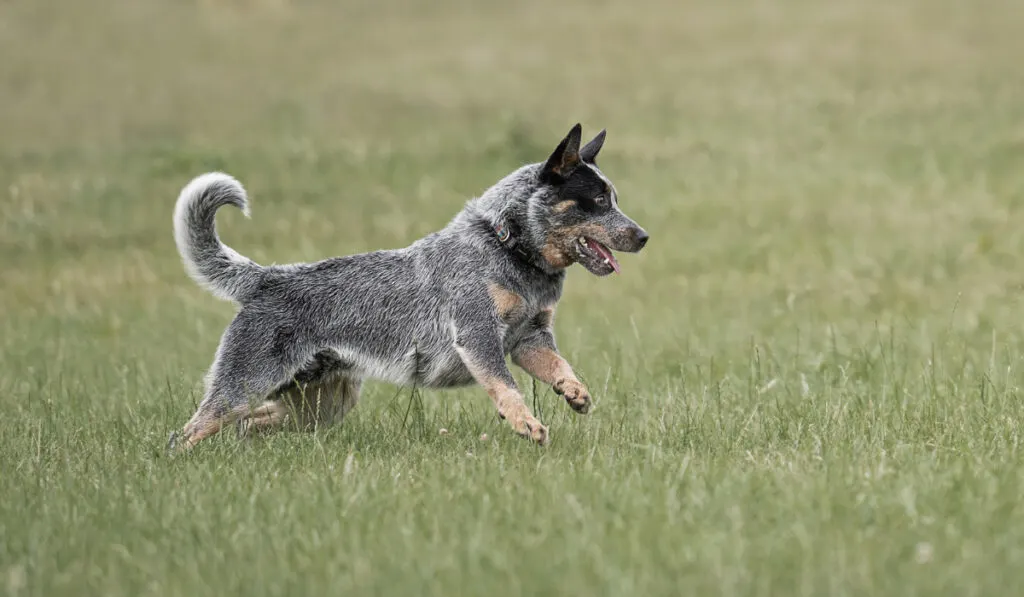
Color and Coat
Another aspect of the Cowboy Corgi that seems to come from a more dominant parent gene is its color, and this time the Australian cattle dog takes the prize.
While they have the shape and build of a typical Pembroke Welsh Corgi, their coat color combinations clearly come from their Australian parents. With tri-color, sable, roan, or merle coat colors and patterns, this breed of Corgi definitely has some Australian flare!
If there is one aspect of the Cowboy Corgi that is slightly negative, it’s the fact that they shed hair. You see, they have inherited a double coat from both their parents. A coat that could only have been developed by hard-working dogs that spent a lot of time battling harsh weather elements while working the land.
Both the Australian Cattle Dog and the Pembroke Welsh Corgi did just that. As a result, the Cowboy Corgi has a medium-length double coat consisting of an undercoat that is weather-resistant and an outer coat with slightly longer hair.
If you suffer from allergies, the Cowboy Corgi is a breed that may not be for you. The Cowboy Corgi will fully shed their undercoat twice a year and is, therefore, not a hypoallergenic breed.
Grooming
As a result of so much shedding, your Cowboy Corgi will require some TLC when it comes to grooming. To keep their coats in tip-top condition, they must have them brushed regularly, and by regularly, I mean pretty much every day.
While regular brushing seems like a lot of hassle, don’t forget that Cowboy Corgis are very affectionate animals, so they will absolutely love the attention. Think of grooming time as bonding time, and it won’t be long before you’re both feeling the love.
As far as bathing goes, you don’t have to worry as much. If you keep up with brushing requirements, you will only have to bathe them once every other month. Of course, the only exception is if they roll around in something nasty that gets matted up in their hair.
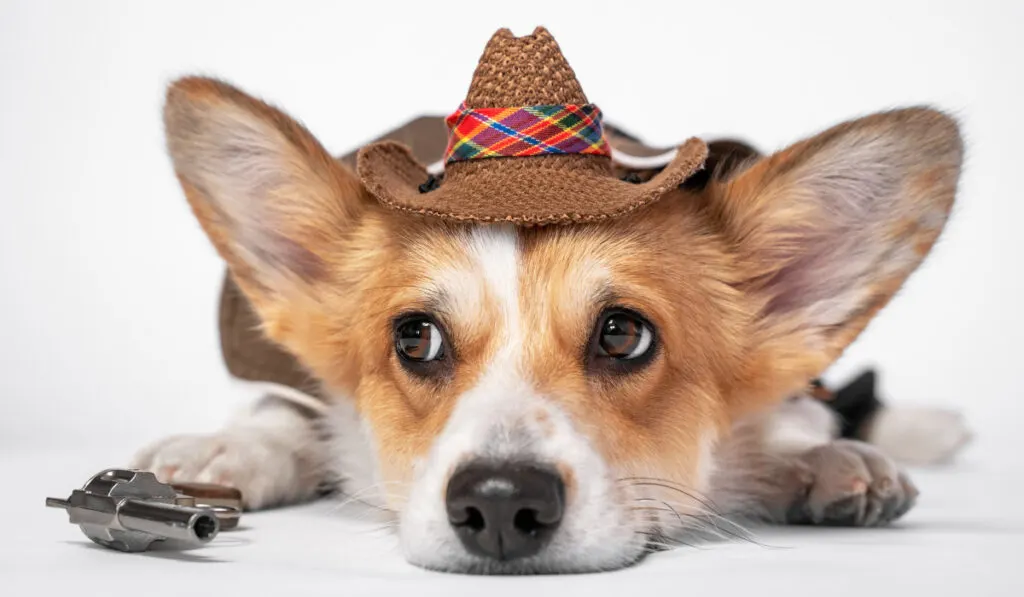
Health Considerations
Because the Cowboy Corgi is a mixed breed, it doesn’t just inherit all the positive aspects of its parent breeds. Some of the more negative effects can be passed down also. You need to watch out for health issues and conditions from which the parent breeds may have suffered so that your Cowboy Corgi can live a full, healthy life.
Eye Conditions
One condition that the Cowboy Corgi may inherit from both parent breeds is “progressive retinal atrophy,” which affects their eyes.
Your dog has photoreceptors in its eyes, which are responsible for capturing light. This disease stops the photoreceptors from functioning and can cause night blindness. Treatment for this condition is very effective, but without it, it can lead to complete blindness.
Congenital Hereditary Sensorineural Deafness (CHSD)
The genes inherited can lean one way or the other. If your Cowboy Corgi has stronger Australian Cattle Dog genes, it may be susceptible to Congenital hereditary sensorineural deafness (CHSD).
As its title suggests, this condition can lead to deafness and can be identified in pups after they are about six weeks old. Unfortunately, this hereditary disease has an all-or-nothing effect, meaning that your dog can have it in one or both ears, and not at all.
Von Willebrand’s Disease
Some of you may be familiar with Von Willebrand’s disease, as it can affect humans and dogs alike. It is a blood disease that often results in nosebleeds, bleeding gums, and blood in your dog’s poo.
If you take your Cowboy Corgi to the vet, they can test DNA to detect if your dog has a disease carrier or whether they are genetically clear.
While this disease cannot be cured, it can be monitored and treated. Diagnoses are usually made between three and five years of age.
Hip Dysplasia
Hip dysplasia is another common inherited condition from the Corgi side of the family. It affects the hip joint on one or both sides and can only be detected through X-ray.
Symptoms include lameness in one or both rear legs, but a dog with this condition may not feel any pain at all.
Ask the breeder you are buying your Cowboy Corgi from if they have documentation proving that your pup’s parents were tested and cleared of hip dysplasia.
Unfortunately, Corgis are also prone to arthritis, so your Cowboy Corgi is still a candidate for developing hip dysplasia later in life, even if its parents were given the all-clear.
Obesity
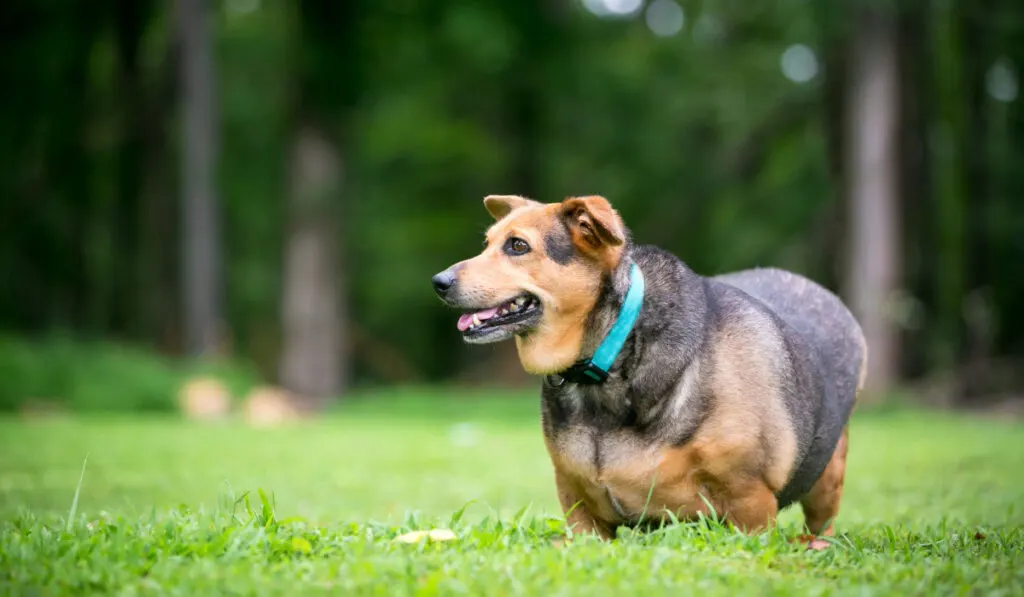
With short legs and barrel-shaped bodies, if your Cowboy Corgi gains weight, it will surely struggle. They love to eat, and while they have the high energy levels necessary to burn off excess fat, they can also be very manipulative.
Don’t let their adorable eyes convince you to overfeed them while begging and whimpering at your feet.
Obesity is no joke for these creatures, so monitoring their diet is very important. A pound or two of excessive weight can leave your little canine friend struggling.
Nutrition
While Cowboy Corgis often lean toward their Corgi parent in terms of size and stature, they can also be slightly bigger if their Australian Cattle Dog genes are stronger. So, your Cowboy Corgi may have greater dietary requirements than your average medium size dog.
With their excessive energy and ability to go for miles and miles, your Cowboy Corgi may need the nutrition of a medium- to large-sized dog breed.
Cowboy Corgis should consume the same number of calories as they burn each day, so monitoring their diet and exercise together is very important. But if your Corgi isn’t getting enough exercise and you’re feeding it a diet much higher in calories, you may have an obesity problem on your hands.
Training
Cowboy Corgis are a very intelligent breed, so their level of training is really up to you. They respond very well to positive reinforcement training, and if you begin when they are young, results should happen pretty fast.
While basic techniques should be no trouble, advanced training will mentally and physically stimulate your Cowboy Corgi.
Cowboy Corgis have strong herding tendencies and may snap at young children if they are not socialized properly. Socialization training has to begin early on. And remember, go easy on the treats during their training process.
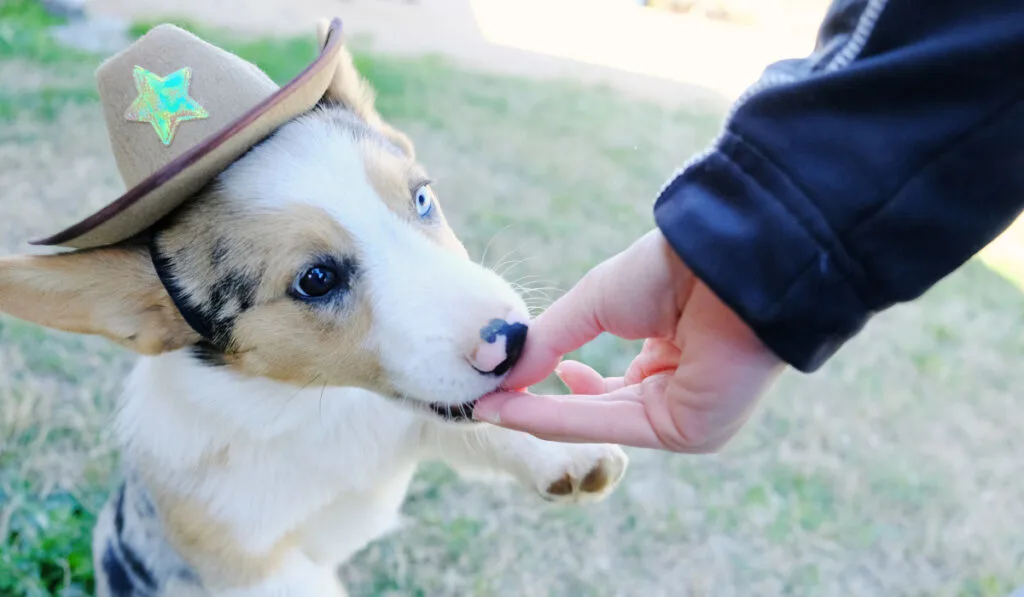
How to Get Your Hands on a Cowboy Corgi
If you’re looking to add a Cowboy Corgi to your family, the best place to start looking is the animal shelter. Pets end up in the shelter through no fault of their own and for many different reasons. It could simply be because their previous family could no longer afford to keep them.
Owning any dog has its challenges, and these dogs are no different. I can tell you from my own experience that finding a dog at the shelter and making it part of your family is a very special experience.
Alternatively, if you do your homework and find a reputable, moral breeder, a Cowboy Corgi should cost somewhere between $1,000 and $2,800. They are not the most common puppies and are regarded as a “designer” mixed breed.
Final Thoughts
With two parent breeds that earned their place in history as hard-working cattle herders, the Cowboy Corgi is an adorable, intelligent breed bursting with energy.
Cowboy Corgi is the perfect pet for an energetic family as this dog is loyal, friendly, and so much fun!
Resources
- https://en.wikipedia.org/wiki/Royal_corgis
- https://en.wikipedia.org/wiki/Pembroke_Welsh_Corgi
- https://en.wikipedia.org/wiki/Australian_Cattle_Do
- https://stumpsandrumps.com/what-is-a-cowboy-corgi/
- https://keepingpet.com/cowboy-corgi/
- https://www.akc.org/dog-breeds/hyphttps://canna-pet.com/articles/corgi-health-problems-issues/oallergenic-dogs/
- https://bmcvetres.biomedcentral.com/articles/10.1186/1746-6148-8-202
- https://www.humanesociety.org/resources/adopting-animal-shelter-or-rescue-group
- https://rockykanaka.com/cowboy-corgi/

